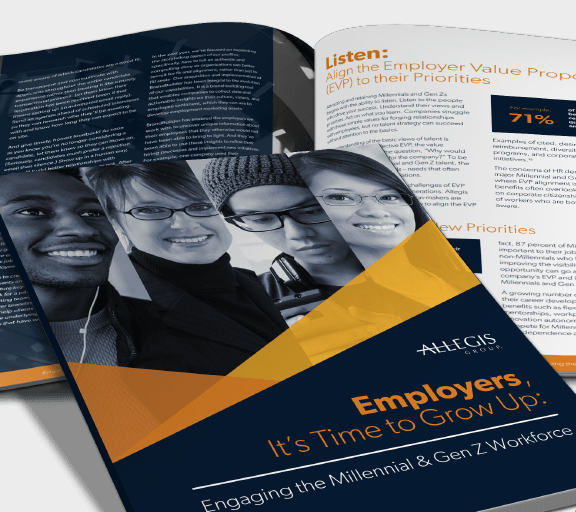How to Recruit Millennials and Gen Zs - a Millennial Perspective

Blog authored by Kathryn Minshew, Cofounder & Chief Executive Officer, The Muse
There is no “one size fits all” employer brand strategy that is guaranteed to attract all of today’s top Millennial and Gen Z talent. Every organization is different and, as such, every employer brand has to reflect what makes the culture, values, and mission unique. Above all, however, an employer brand has to be authentic. Millennial and Gen Z Candidates want to see that the story they hear during the recruiting process matches the reality of their day-to-day when they come on board (and if the two don’t match up, they will be a lot less likely to stick around).
At The Muse, we’ve seen how companies struggle to convey their employer brands in ways that resonate with the right people – those who are aligned with their core values and identify with their culture – with Millennial and Gen Z candidates being especially hard to reach. We understand it is a process that can oftentimes be overwhelming, but we’ve helped over 700 companies get it right, and we’ve picked up a few insights, tips and strategies for how to recruit Millennial and Gen Z talent along the way.
Be Intentional: Don’t Guess or Make Assumptions About What Millennials and Gen Zs Want in a Workplace
There are many stereotypes surrounding Millennials, and one of the biggest mistakes employers can make is immediately operating on those mistaken assumptions. For example, touting “cool stuff” like a ping-pong table and free lunch isn’t going to get their attention. And, using flashy perks as a tactic to attract and recruit Millennials ultimately makes it more difficult to connect with them as candidates (and as individual people) in an authentic way.
Rather, Millennials want to feel like their careers have a real impact. They look for employers with values that match their own and companies where they can see themselves learning and growing. That’s why it’s so important to have a strong employer brand. When companies know who they are and what they stand for, they can appeal to the best-fit candidates and hire people who want to stay on board and become top-performing employees and advocates.
Part of employer branding as a successful recruiting strategy is also accepting that your company and culture won’t be the right fit for everyone, and that’s totally fine. Employers that focus on finding cultural and experiential fits will be empowered to make more intentional and considerate hiring choices.
Be Honest: Focus on Qualities That Make a Great Relationship
The best workplace experiences are built around an understanding of fundamental relationship dynamics (i.e., values, trust, vision, effort, and selflessness). The same rules apply to creating meaningful and lasting relationships with Millennial and Gen Z candidates.
Start by putting forth an authentic employer brand story. Be honest about company culture, values, and what it’s like to come into work every day so potential employees can make informed decisions about whether to apply. An honest story not only brings in a stronger pool of applicants, but it also allows employers to be more aware of which candidates are a good fit.
Be transparent and communicate with applicants throughout the entire candidate experience rather than treating it like a purely transactional process. Let them know their application has been received (even if that means setting up an automated email reply). Send an agenda ahead of scheduled interviews so they can research who they’ll be meeting with and know how long they can expect to be on site.
And give timely, honest feedback! As soon as you know you’re no longer considering a candidate, let them know so they can move on. (Seriously, candidates much prefer a rejection email than silence.) Show up in a human way, and you’ll build better relationships with candidates whether you hire them or not. After all, candidates talk, and your silver-medal candidate today may be tomorrow’s dream hire.
Dig Deep: Take Time to Understand Your Company’s Real Story
We started The Muse because we wanted to give people the tools to make informed decisions about their careers. Our company profiles are a huge part of this mission because they give candidates visibility into what an office environment actually looks like, and allow job seekers to hear directly from current employees of companies they’re interested in.
For us to create content that accurately represents an employer’s brand, we first have to capture key insights about what it’s really like to work for a particular company. Our client-supporting teams are trained to be more like employer branding consultants, and are truly able to help clients shape or reshape their stories, diagnose underlying problems, and share best practices that have worked for others.
In the past year, we’ve focused on expanding the storytelling aspect of our profiles; specifically, how to tell an authentic and compelling story so organizations can better recruit for fit and alignment, rather than just to fill seats. Our acquisition and implementation of BrandBuilder has been integral to the evolution of our capabilities. It is a brand-building tool that enables companies to collect data and actionable insights on their culture, values, and employee sentiment, which they can use to develop employment marketing assets.
BrandBuilder has enabled the employers we work with to uncover unique information about their employees that they otherwise would not have been able to bring to light. And they’ve been able to use those insights to refine their hiring processes and implement new initiatives. For example, one company used their BrandBuilder findings to inform their employee resource groups and identify people with expertise in certain skills that other employees could tap into when they needed help. Another has relied on the data to brainstorm more tailored rewards programs and offsite events. We have also seen organizations benefit from increased transparency, more informed candidates, more detailed and accurate job descriptions, new employee advocates, and an improvement in candidate experience scores from interviewees.
Understanding and defining company values, creating a positive candidate experience, uncovering and empowering employee brand advocates: these efforts all tie back to attracting people who are the right fit to join your team. We have seen companies benefit in big ways from being honest and transparent – and be able to create a better overall work experience in the long run.


